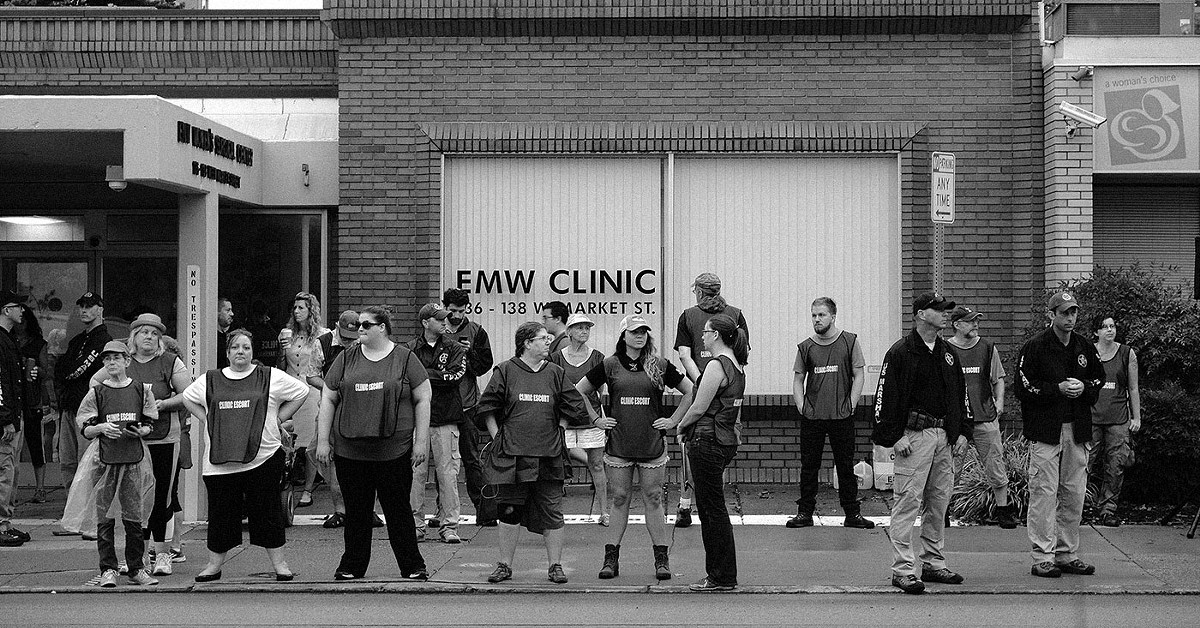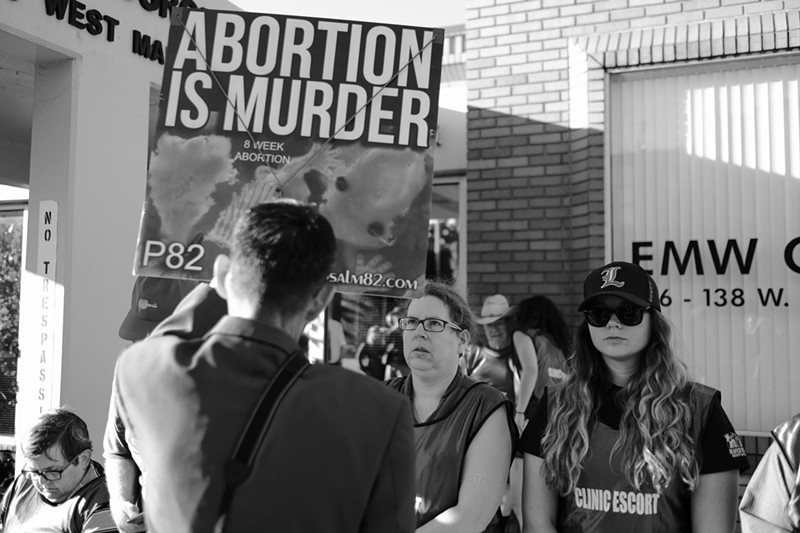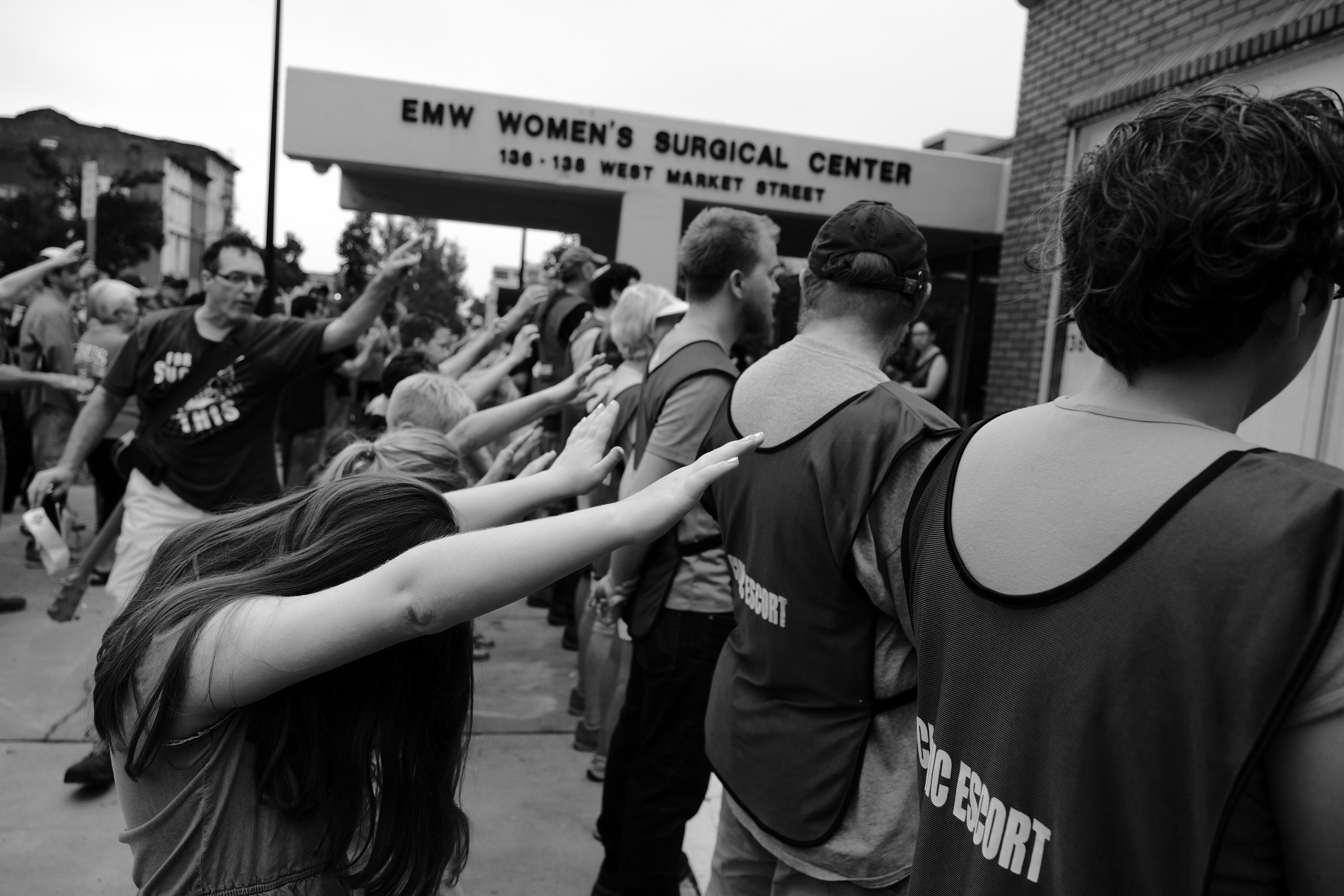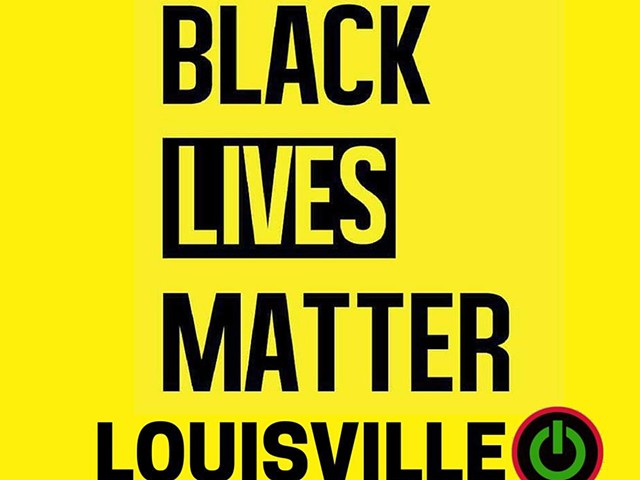You notice her when she enters the EMW Women’s Surgical Center early one July morning. She is accompanied by a man, who has a brightly colored blanket slung over one shoulder, and a toddler, which explains the blanket. Or maybe it’s for her, later on.
The family makes it past the circus outside, one approaching three-ring levels with an amped-up live band, more than 100 protesters holding forth and holding signs and street preachers toting Bibles and shouting the Word. And then there are the low-key but identifiable U.S. marshals staking out a court-mandated buffer zone and cleared pathway to the door the family seeks. You hear even Netflix is out there with cameras for a documentary.
The protesters’ shout that the woman hears — “Please don’t do it.” — will play on a loop in her mind, once she is inside.
Her path crosses all that, and she braves it, every bit of it, a pumped up, steroidal version of what normally takes place at abortion clinics throughout the country.
She has come to EMW for a legal abortion at the same time members of the antiabortion organization Operation Save America — an American flag, a cross and “Jesus is the Standard” are part of their logo — and other antiabortion activists jam the sidewalk outside the clinic in Louisville. OSA, formerly Operation Rescue, was in town for a week-long, midsummer “national event,” staging protests at Kentucky’s last abortion clinic.
Inside is Dr. Ernest Marshall, the founding “M” in EMW, who even through the walls could hear the spectacle outside.
“I’ve listened to them a lot over the years,” he said. “I’m a faithful Christian, and there’s no resonance with me. There’s a lot of dissonance. I just can’t imagine Jesus humiliating someone, abusing them and judging them. I just can’t imagine Christ doing that.”
Pictures of aborted fetuses emblazon posters hanging on a truck that was circling the block and some on stationary banners. She and others who enter won’t see OSA’s giant TV that will carry footage of an abortion on another day, at another place.
She has driven hours to get here.
State works to close last clinic
EMW, established in 1981 and at its Market Street location since 1993, is one of about 1,670 abortion providers in the U.S., a number in decline at the same time “crisis pregnancy centers” run by antiabortion groups have proliferated to about 4,000 nationally; some of those antiabortion centers receive state funding. There are two such crisis centers in close proximity to the lone Kentucky abortion clinic, one right next door. Women coming to EMW are reminded not to mistake those centers with their proselytizing messages for the clinic and its medical care.This abortion clinic’s last-and-lone status in Kentucky means 99 percent of Kentucky’s counties have no clinics that provide abortions. It means 75 percent of Kentucky’s women live in counties with no local abortion clinic, which means some of them have to travel hundreds of miles for this reproductive health care option. A bonus onerous burden for them: They have to make an additional trip if they have no wireless access to fulfill a telemedicine consultation 24 hours before the procedure, which now is required by state law.
Clearly, the sidewalk circus outside abortion clinics has found a home in state legislatures, too.
Lawmakers at odds with abortion polling
While many of the rest of us slept, states passed more than 300 laws including such restrictions on abortion providers and their patients between 2010 and 2016. These busy years account for 30 percent of such laws since the U.S. Supreme Court’s 1973 Roe v. Wade decision made legal abortion the law of the land. This, despite a recent Pew Research Center study that says about six in 10 Americans believe abortion should be legal in all or most cases, and almost seven in 10 Americans think Roe should not be completely overturned.Antiabortion activists want to see Louisville’s clinic closed.
If that happens, Kentucky will be the first state in the nation without an abortion clinic.
They have a friend in Kentucky Gov. Matt Bevin, who has ratcheted the state’s legal wrangling with the longtime clinic up to 11.
Earlier this year, Bevin’s Republican administration raised objections to the clinic’s longstanding agreements and arrangements regarding hospital transfers and ambulance transport, and threatened to close it. The clinic and its legal team say it is in compliance with the law and are taking the state to federal court to settle the dispute. A non-jury trial, which could decide the fate of EMW, is scheduled to begin in Louisville on Sept. 6.
That courtroom showdown awaits. But the din that cranks up shortly after the sun shines this July morning, signifies that high-noon moment in the near future as well as the shadows threatening the clinic’s existence.
Escorts create a ‘bubble of calm’
This surviving urban outpost of choice and freedom means the women have friends, too.Some are behind the scenes and behind the doors the women will enter, fighting to make sure those doors stay open.
Some are there for the eye to see.
Lined up and flanking the front of the clinic and its court-supported buffer zone, are purple-vested clinic escorts, who focus on calmly assisting patients into the clinic. They remain stoic even when protesters hold signs and smart phones inches from their faces, even when they are called “deathscorts” and compared to guards at Auschwitz. As a protester talks nonstop in the face of one, the escort yawns. The friends in the purple vests are young and old, tall and short. One is in a wheelchair. One leans against a cane. They are there, they stay, until every scheduled patient is checked inside.
One longtime escort started volunteering after George Tiller, a Kansas doctor who performed late-term abortions, was assassinated in church. She said she is there to create a “bubble of calm” for the women who come to the clinic. And, she said, because if women don’t have access to all options when they’re pregnant, their options in life are limited.
One of the OSA activists there this particular morning amplifies the recording of a crying baby on a streetside P.A. system. (On other days, without the elaborate setup, some activists bring their own bullhorns.) The activist pauses the cries to provide a running interpretation of them, a stop-and-go, closed-caption narrative of a selfish “mommy” more interested in a boyfriend and a job, and a “daddy” who was only interested in getting her into the backseat.
Another activist sports a T-shirt calling homosexuality a sin, Islam a lie, evolution a delusion, feminism a rebellion and liberalism a false religion.
There are also signs with the initials “WWJD”... what would Jesus do?
A few of the morning’s scheduled clients are defiant as they make their way through this to the front door.
One young man with a young woman gives the crowd a single-finger salute on each of his hands as they walk inside. Later in the day, all the protesters are gone and no one bothers them when this couple leaves after their appointment.
Another young woman entering with a friend utters “shut your ass up,” as they make it inside.
But another young woman arrives, breathing as if she has run a race. You can’t be sure, but you think this same person, who was wearing a hoodie in full deployment as she came in, is part of a tearful scene you witness a little later. Her head is naked now, and so is her anguish in the moments before she and the young man with her leave the clinic shortly, without having the procedure. No one working inside interferes as this wrenching scene plays out; her choice is her choice, no matter what that is. She continues to cry as the two walk outside. There, the crowd cheers, her emotional agony a backdrop to what the celebrants greet as victory.
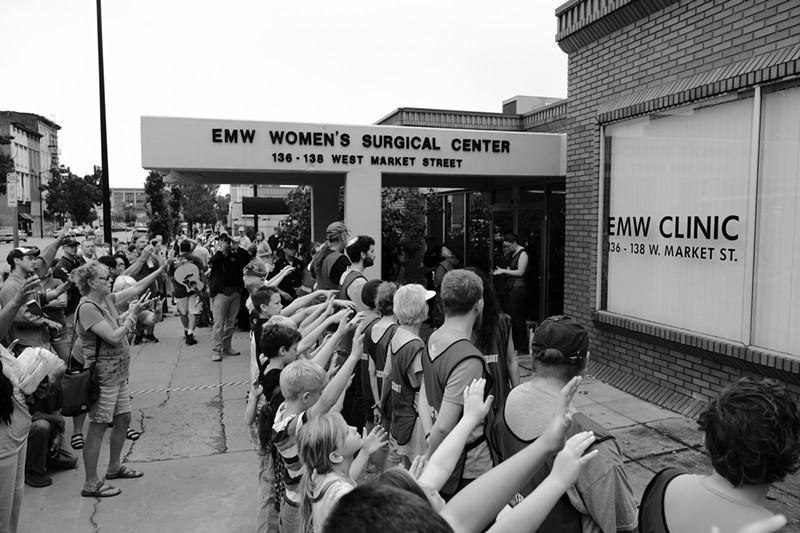
Something she has to do
The woman and man with the toddler have driven hours before they arrive at this place, at this time in her life and in the life of the clinic. They make it through the front doors. The outside cry of “Please don’t do it” comes with her.The people who shout for her to change her mind don’t know why she is here. The U.S. Supreme Court has ruled it is none of their business. But inside, she shares a little about herself and what she thinks of all this.
The people who try to stop her don’t know that the pregnancy she has decided to terminate carries many medical complications for her, that the abortion she seeks is known as therapeutic.
That the fetus she carries would not live if carried to term.
That, in her words, this is not something she wants to do, but it’s something she has to do.
That if they were in her place, the people who tried to stop her with their words and their presence outside would do the same thing.
That their shouting makes it harder for her, but she knows hers is the correct decision.
When her family comes inside the clinic, her male companion has to go back to the car to retrieve the photo ID required of each patient and the person who accompanies her. For the short while that will take, he leaves her, their toddler and the blanket in the waiting area, and that’s why she doesn’t see what you see: That it was even harder. As he starts walking back toward where they parked, an antiabortion activist with Bible in hand peels away from the group and chases after him down the sidewalk. Nevertheless, he persisted: The man returns to the clinic with his ID and again takes his place with her and the boy and the blanket in a place that feels a little like sanctuary.
There is no American flag, no cross, on the logo of the clinic, but there is inside its walls a quiet sense of crusade in preserving and ensuring women’s freedom and in providing a place of safe harbor for women in a time of need.
Anne Ahola, the longtime executive director of EMW, says simply, “God is in here, too.”
Said Dr. Marshall: “There’s more Christianity inside than outside. We are compassionate, loving, forgiving, understanding, nonjudgmental. Pick a side. What side would Jesus walk on?”
Doctor: ‘Be loving’
Marshall is a Louisville native and UofL Medical School graduate who has been a doctor for 37 years. He retired from obstetrics 12 years ago and from his private practice six years ago. He is one of three physicians who performs surgeries at the clinic and is doing so on this day. He said, “I believe in quality medical care. I believe the doctor should give the best available, be loving and compassionate and empathetic with his patients. I think abortion procedures should be treated like any other procedure ... I believe women should have control over their own reproduction.”The latter belief was fed by his own background. One of 10 children, he said, “My mom had 13 pregnancies, and she didn’t get a chance to choose how many kids she wanted, or control her reproductive life, so I always had an interest in women taking charge of their life, taking charge of the number of children they have, taking charge of how their family is to be.”
He said the interference outside does result in its desired effect — deterrence — but that the antiabortionists and their slogans are disconnected from the reality with which and with whom he deals.
“Women put a lot of thought into their decision,” he said, “contrary to what pro-life people think. They think about their lives, their family, about the people around them, the consequences, their future. All are put into their decision-making process.”
The muffled sounds from outdoors let you know the circus continues but at a welcome remove provided by walls, windows and purpose.
Irony of ironies, and as the people who operate EMW suggest, the clinic itself is another buffer zone.
Quiet tones of soothing music filter throughout; Ahola loads the five-disc CD player when she comes to work. The notes are in concert with the muted, pleasing colors of the walls and carpet, as well as the exotic artwork, whose desired effect is a mixture of home and office. The intention is to put patients, who have every reason to feel otherwise, at ease.
Given the uproar around it, sometimes it’s hard to remember that health care and medicine are at the heart of EMW, that this is an outpatient surgical center, one well into its fourth decade of operation and the destination for thousands of women from many states throughout those years. (Ahola will not share numbers, but said about half the patients who come to EMW will have a surgical abortion and about half will opt for medication that induces abortion.)
The people on staff never forget their mission, not even on mornings like this one, when they discover fliers with their names and addresses and labels of “murderer” have been mailed to their neighbors. Ahola says she is concerned for her neighbors’ sakes, and calls her landlord to let him know about the fliers. Marshall acknowledged the need to think about safety, but allows that “if you read that flier, you see how ignorant it is.”
Expressions of gratitude
As the phone keeps ringing inside and the protesters keep their vigil outside, the staff goes about interacting with each patient.The checklist before the procedure includes payment (and information on groups that will help with that if the patient needs financial assistance), lab and blood work, medical history and state-mandated ultrasounds of the fetus. Each patient also watches a video sharing information about the procedure and its side effects and risks, which also walks them through the consent form. If the patient is a minor, a parent has to watch the video and sign the form. Ahola said she remembers a 12-year-old patient. And there is a counseling session before the procedure, in which each patient is asked if she has any questions and if she is sure about her decision.
A homey office in which Ahola conducts some of the counseling sessions has her MSW diploma in a frame on the wall and a poster that reads: “Any amount of regret doesn’t change the past. Any amount of anxiety doesn’t change the future. But any amount of gratitude can change the present.”
In these tough days for EMW, expressions of gratitude are heaped in a birdbath outside that office. And they are arranged in a decorative tree on the wall of a shared space for staff. They are letters from supporters from all over the country, who have written to the beleaguered clinic in their hour of need.
“When women are supported, educated and healthy the world is a better place,” writes one.
“Empathy is not weakness — it is the language of resistance,” reads another.
And: “Keep the faith, y’all!”
‘If the court agrees, we will carry on’
After a brief break, Marshall prepares to leave his office to tend to his patients. They happen to be women who have decided to have an abortion.He is the surviving member of the trio of doctors whose initials stand in the clinic’s name. From the beginning, he said, the clinic has been dedicated “to quality medical care for women who needed abortions, committed to stay open no matter what, as long as (abortion) remained legal, so we have trudged on, through thick and thin, through court challenges, through lean times, through everything. This is not the first time we’ve gone to court, even federal court. It’s always a challenge and a struggle.”
The next turn in the road is a court date in September, when Kentucky’s last operational abortion clinic will fight for its right to stay open and to serve more women like the ones you have seen this morning.
You wonder about them, the ones who deserve choices and will always need a place like the EMW Women’s Surgical Center, as Marshall says, “If the court agrees, we will carry on.” •
Pam Platt is the former editorial director of The Courier-Journal. She briefly worked for Planned Parenthood and has taken part in a demonstration in support of the EMW clinic. Reporting this piece was the first time she met any of the clinic staff.
Doctor, ‘What will happen if abortion’s not available?’
Dr. Willie Parker, author of “Life’s Work: A Moral Argument for Choice,” uses the teachings of Dr. Martin Luther King Jr. when he speaks of the civil and human rights implications of abortion and women.“Dr. King brought precision and clarity to the relationship between science and religion,” he told LEO during a visit here in July before taking part in a panel discussion after a special showing of “Jackson,” a documentary film about the last abortion clinic in Mississippi.
The Berea College graduate shared that he spent time on the pulpit when he was younger, and he is comfortable in invoking his Christianity publicly in discussing his life’s work.
He recalled the speech King made about the Good Samaritan. Others would ask: If I stop to help this person, what will happen to me? Instead, the Good Samaritan turned the question into: “What will happen to this person if I don’t stop to help?”
That was one of the turning points for Parker, who asked himself as a physician who was treating women in his practice: “What will happen if abortion’s not available?”
Parker, who now performs abortions at two clinics in Alabama and one in Georgia, appeared in the film when he performed the surgery in Jackson. EMW Women’s Surgical Center was one of the hosts of the film screening.
Parker’s visit came just a few days before Operation Save America was in Louisville. We talked at the EMW office of Dr. Ernest Marshall, a discussion touched on numerous topics but returned to what he sees as the immorality of forced motherhood.
If anything, he sounds grateful for being of service to his patients. “The women I see teach me how to be more fully human.”
And, when asked about the anti-abortion protesters that dog every abortion provider, he said he thinks many of them are sincere but misguided in that sincerity.
He says the compassion he derives form Christianity leads him to his work.

